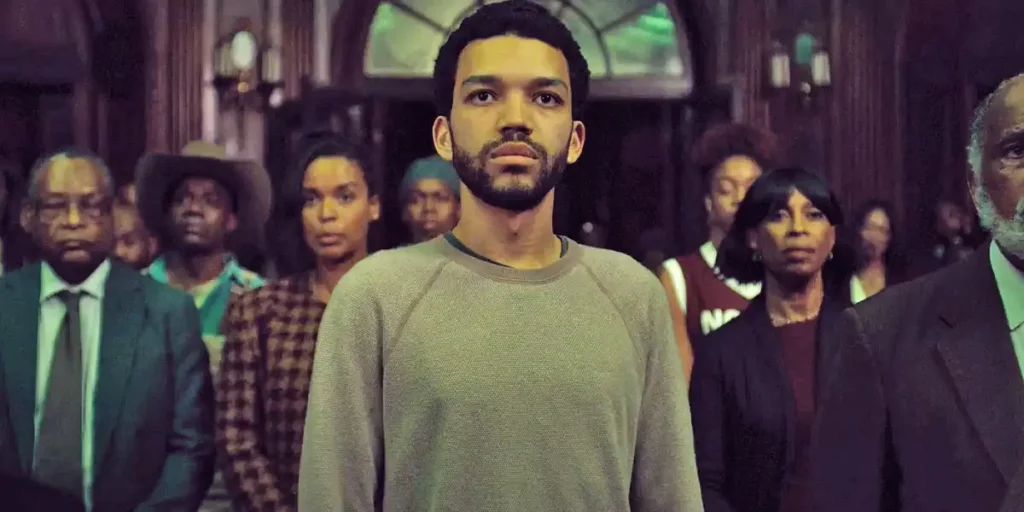The American Society of Magical Negroes has interesting ideas, but the film’s argument about respectability politics could have been explored better without the “magical society” at its core.
The American Society of Magical Negroes begins with the definition of a magical negro. Magical negroes are put on this earth with the sole purpose of helping white storylines. While many think that this trope just occurs in media – for example, when a Black character in a movie only appears so that they can guide the white protagonist with their wisdom, the film’s premise is that it also takes place in real life. In The American Society of Magical Negroes, fact, there is a society of Black people whose career is dedicated to supporting white people in discomfort. Throughout the film, we follow Aren (Justice Smith), the society’s latest member, on his very first assignment.
At the very beginning of the movie, I found this concept extremely fascinating. The world building is tremendously creative and often funny. Nicole Byer, who plays the society’s president, steals every scene that she’s in, easily getting the most laughs out of anyone in the cast. Unfortunately, besides a few comedic moments here and there, the whole concept of this secret society dedicated to serving white people is unnecessary for the argument the film is trying to make.
Aren’s first assignment is to help a man named Jason (Drew Tarver), whose white discomfort is hitting a peak due to work struggles. Aren starts to work at the same tech company as Jason, and begins to boost his confidence from their initial meeting. At this job, Aren also meets Lizzie (An-Li Bogan) and develops feelings for her. This poses a huge threat to his assignment, because one of the major rules of the society is that you must keep your client’s interest above all else, or the magic that keeps the society running will fail.
The American Society of Magical Negroes is ultimately examines the effect of respectability politics – that is, when People of Color intentionally act in a more agreeable and non confrontational way to white people so that they will not be perceived as threatening. My biggest issue with the film is that respectability politics could have been explored a lot better without the inclusion of the magical society.
From the beginning of The American Society of Magical Negroes, we quickly realize that Aren is subservient in every sense of the word. For example, when he tries to make a business deal with an art dealer, they hand him their glass, thinking he’s was a waiter. Instead of standing up for himself, he takes the glass and ends the conversation before it even starts. Aren’s whole arc is about understanding his role within respectability politics, and the immeasurable value of asserting himself in white-dominated spaces. All of his character development happens on his assignment, whereas the scenes at the society take away from anything interesting happening on screen.
While it’s hard to get past my issues with the main plot of the movie, I still somewhat enjoyed it. There are consistently funny moments where, even if the satire didn’t work for me, I still laughed at all the one liners. Also, Justice Smith’s performance is great, especially in his final monologue. His chemistry with An-Li Bogan is just as strong, but it made me even more frustrated when we would go back to the society, because it prevented more scenes between the pair from taking place.
Overall, The American Society of Magical Negroes is such a mixed bag. On one hand, it’s well produced with some solid performances; on the other hand, I had major issues with the titular concept. There is a great film somewhere in here, but with the lack of focus on the ideas that really matter, I can’t say the film is worth the watch.
The American Society of Magical Negros premiered at the 2024 Sundance Film Festival and will be released in US theaters on March 15, 2024 and in UK cinema on March 22. Read our list of 20 films to watch at Sundance 2024 and take a look at all our Sundance reviews!

